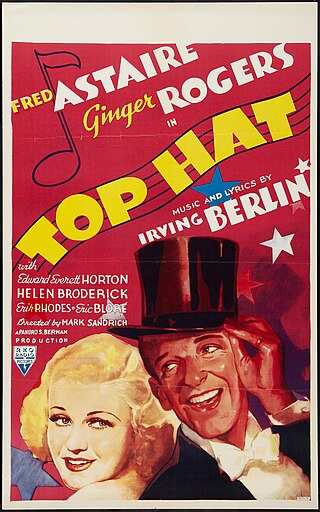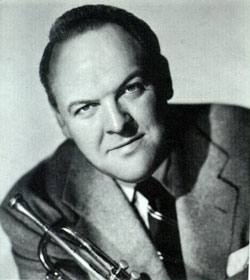Related Research Articles

Top Hat is a 1935 American musical screwball comedy film in which Fred Astaire plays an American tap dancer named Jerry Travers, who comes to London to star in a show produced by Horace Hardwick. He meets and attempts to impress Dale Tremont to win her affection. The film also features Eric Blore as Hardwick's valet Bates, Erik Rhodes as Alberto Beddini, a fashion designer and rival for Dale's affections, and Helen Broderick as Hardwick's long-suffering wife Madge.

Fred Astaire was an American dancer, actor, singer, choreographer, and presenter. He is widely regarded as the "greatest popular-music dancer of all time". He received numerous accolades including an Honorary Academy Award, three Primetime Emmy Awards, a BAFTA Award, two Golden Globe Awards, and a Grammy Award. He was honored with the Film Society of Lincoln Center tribute in 1973, the Kennedy Center Honors in 1978, and AFI Life Achievement Award in 1980. He was inducted into the Hollywood Walk of Fame in 1960, American Theatre Hall of Fame in 1972, and the Television Hall of Fame in 1989.
This is a list of notable events in music that took place in the year 1936.

Edward William May Jr. was an American composer, arranger and trumpeter. He composed film and television music for The Green Hornet (1966), The Mod Squad (1968), Batman, and Naked City (1960). He collaborated on films such as Pennies from Heaven (1981), and orchestrated Cocoon, and Cocoon: The Return, among others.

Dorothy Fields was an American librettist and lyricist. She wrote over 400 songs for Broadway musicals and films. Her best-known pieces include "The Way You Look Tonight" (1936), "A Fine Romance" (1936), "On the Sunny Side of the Street" (1930), "Don't Blame Me" (1948), "Pick Yourself Up" (1936), "I'm in the Mood for Love" (1935), "You Couldn't Be Cuter" (1938) and "Big Spender" (1966). Throughout her career, she collaborated with various influential figures in the American musical theater, including Jerome Kern, Cy Coleman, Irving Berlin, and Jimmy McHugh. Along with Ann Ronell, Dana Suesse, Bernice Petkere, and Kay Swift, she was one of the first successful Tin Pan Alley and Hollywood female songwriters.

Swing Time is a 1936 American musical comedy film, the sixth of ten starring Fred Astaire and Ginger Rogers. Directed by George Stevens for RKO, it features Helen Broderick, Victor Moore, Betty Furness, Eric Blore and Georges Metaxa, with music by Jerome Kern and lyrics by Dorothy Fields. Set mainly in New York City, the film follows a gambler and dancer, "Lucky" (Astaire), who is trying to raise money to secure his marriage when he meets dance instructor Penny (Rogers) and begins dancing with her; the two soon fall in love and are forced to reconcile their feelings.

Blue Skies is a 1946 American musical comedy film directed by Stuart Heisler and starring Bing Crosby, Fred Astaire, and Joan Caulfield. Based on a story by Irving Berlin, the film is about a dancer who loves a showgirl who loves a compulsive nightclub-opener who can't stay committed to anything in life for very long. Produced by Sol C. Siegel, Blue Skies was filmed in Technicolor and released by Paramount Pictures. The music, lyrics, and story were written by Irving Berlin, with most of the songs recycled from earlier works.

Broadway Melody of 1940 is a 1940 MGM film musical starring Fred Astaire, Eleanor Powell and George Murphy. It was directed by Norman Taurog and features music by Cole Porter, including "Begin the Beguine".
"All of You" is a popular song written by Cole Porter and published in 1954.

Follow the Fleet is a 1936 American RKO musical comedy film with a nautical theme starring Fred Astaire and Ginger Rogers in their fifth collaboration as dance partners. It also features Randolph Scott, Harriet Hilliard, and Astrid Allwyn, with music and lyrics by Irving Berlin. Lucille Ball and Betty Grable also appear, in supporting roles. The film was directed by Mark Sandrich with script by Allan Scott and Dwight Taylor based on the 1922 play Shore Leave by Hubert Osborne.
"Just One of Those Things" is a popular song written by Cole Porter for the 1935 musical Jubilee.
"Let's Face the Music and Dance" is a song published in 1936 by Irving Berlin for the film Follow the Fleet, where it was introduced by Fred Astaire and featured in a celebrated dance duet with Astaire and Ginger Rogers. The jazz song has also been covered by various artists years following its release, including Nat King Cole, Ella Fitzgerald, Frank Sinatra, Mel Torme, Todd Gordon and others.
"I Won't Dance" is a song with music by Jerome Kern that has become a jazz standard. The song has two different sets of lyrics: the first written by Oscar Hammerstein II and Otto Harbach in 1934, and second written by Dorothy Fields in 1935.
"I Used to Be Color Blind" is a popular song written by Irving Berlin for the 1938 film Carefree, where it was introduced by Fred Astaire. The Astaire recording was very popular in 1938.
"Let's Begin" is a popular song composed in 1933 by Jerome Kern, with lyrics written by Otto Harbach. It was written for the musical Roberta (1933) where it was introduced by George Murphy. In the 1935 film version, the song was performed by Fred Astaire, Candy Candido and Gene Sheldon, with the band.
"I'm Old Fashioned" is a 1942 song composed by Jerome Kern, with lyrics written by Johnny Mercer.
Lew Spence was an American songwriter.
"(Ah, the Apple Trees) When the World Was Young" is a popular song composed by Philippe-Gérard, with lyrics by Angèle Vannier. The English lyrics were written by Johnny Mercer. The original French title was "Le Chevalier de Paris". Apart from a reference to apples, the English lyrics only have minor commonalities with the original French words.
"There's a Lull in My Life" is a 1937 song, written by Mack Gordon and Harry Revel for the film Wake Up and Live. A "torch ballad", it was released in 1937 as a single and became Alice Faye's only major hit record. Other popular versions in 1937 were by Teddy Wilson, George Hall and His Orchestra, and by Duke Ellington.
"I Never Had A Chance" is a popular song written by Irving Berlin, published in 1934. Popular versions that year were by Eddy Duchin and by Glen Gray & The Casa Loma Orchestra.
References
- ↑ "Cover versions of Pick Yourself Up by Fred Astaire with Johnny Green and His Orchestra | SecondHandSongs". secondhandsongs.com. Retrieved 2021-08-04.
- ↑ Fred Astaire With Johnny Green And His Orchestra – The Way You Look Tonight / Pick Yourself Up (1936, Shellac) , retrieved 2021-08-04
- ↑ Mueller, John (1986). Astaire Dancing - The Musical Films. London: Hamish Hamilton. ISBN 0-241-11749-6.
- ↑ Cordova, R. (2017, Nov 05). For sentimental reasons // gregory porter pays touching tribute to nat 'king' cole. Arizona Republic ProQuest 1960001909
- ↑ Obama calls for American renewal, Posted by Foon Rhee, deputy national political editor, in "Political Intelligence" column, January 20, 2009, Boston Globe
- ↑ "No Time for Poetry" by Frank Rich, The New York Times 1-25-09 p. WK10 of NY edition. Retrieved 1-25-09.